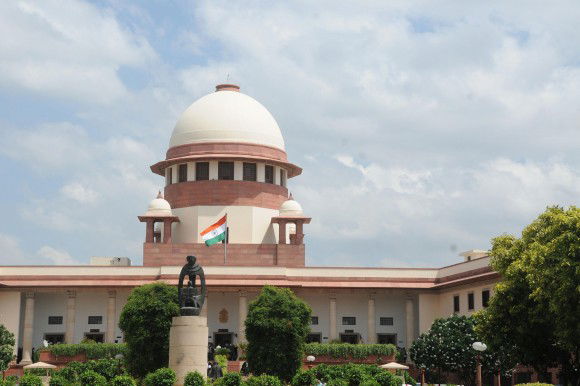Articles features
Removing AFSPA's shield will blunt army's edge, say veterans

New Delhi, July 10
The Supreme Court verdict saying the army should not use excessive force in its counter insurgency operations has not gone down well with the army veterans who feel that it does not reflect their operational principles under which they use minimum of force in operations against insurgents.
The former veterans whom IANS spoke to were unanimous that any dilution of the Armed Forces (Special Powers) Act would affect their operations in dealing with insurgents and consequently the security of the country.
Hoping that the Centre would seek review of the judgement, Lieutenant General J.B.S. Yadav (retd) said that the army seeks to use minimum force in insurgency operations.
"In our training or as a matter of principle we always use minimum force and we scrupulously abide by the ten commandments of the army chief," Yadav told IANS.
The commandments include respecting human rights, no torture resulting in death and no act resulting in military disgrace.
Lt. General Yadav, who retired in the year 2006 and had participated in anti-insurgency operations in Northeast, Assam, Punjab and Jammu and Kashmir said: "The operations are done in good faith and not to kill anyone."
"To pass a general order that the army will not do this, army will do that, do's and dont's will give upper hand to terrorists. Supreme Court should not pass such judgement which are very difficult to maintain and implement," he said.
He pointed out that more than 10,000 officers and solders have laid down their lives in such operations which would be more than the fatalities suffered by the army during the wars.
The Supreme Court on July 8 had ruled the army cannot use excessive force during counter-insurgency operations in areas declared disturbed under the AFSPA and criminal courts do have the jurisdiction over cases of alleged excesses by security forces.
The judgement came on a petition by Extra Judicial Execution Victims Families Association (EEVFAM) seeking investigation into 1,528 cases of alleged killing since 1978 by the army, Assam Rifles and Manipur police in their anti-insurgency operations in Manipur.
On the court's decision that it will decide in the next hearing on the investigation of 1,528 cases (of alleged killings since 1978), Lt. Gen Yadav wondered if anything tangible would come out from such an exercise, noting that an officer who was just a Lieutenant in 1978 has already retired and many of the army officers may not be there.
"Investigation on part of the army has already taken place. It's so difficult to open these cases. How will they collect witnesses," he further said.
Venting his wrath on "NGOs targeting armed forces" under the cover of human rights, Lt. Gen Yadav said these cases were "motivated cases done by NGOs who are having their own agenda to demoralise the army".
Major General Ravi Arora (retd) said that army does not act impulsively and its operations were based on intelligence inputs.
He said it should be left to the discretion of the military commander how to deal with armed militants acting against forces.
He said all precautions were taken and every effort made to secure the presence of police personnel while also taking village representatives on board during anti-insurgency operations.
"If every operation will be examined and they start taking action then army people will play safe and not carry out their job properly for fear of prosecution. If AFSPA is not there, nobody will carry out the operation because tomorrow they have to answer everything in court. If AFSPA goes, it will have demoralising effect," he said.
Referring to the part of the judgement that armed forces have failed to curb insurgency in turbulent parts of the country in the last six decades, Maj Gen Arora told IANS: "I would like to say that many a times the army has controlled the situations, the insurgency has gone down, but because of no meaningful political followup to come to a political solution, the insurgency then erupts again..."
Major Genral Anil Verma, who is now associated with the Association of Democratic Rights, said the army gets involved only when the situation so demands, and taking away the shield provided by AFSPA would have an adverse impact on the operations.
"If it is (only) a law and order situation let the police do the job. Army is called when it cannot be tackled by the police. We are very careful about human rights," he said.
(Parmod Kumar can be contacted at [email protected] and Garima Tyagi can be contacted at [email protected])
The former veterans whom IANS spoke to were unanimous that any dilution of the Armed Forces (Special Powers) Act would affect their operations in dealing with insurgents and consequently the security of the country.
Hoping that the Centre would seek review of the judgement, Lieutenant General J.B.S. Yadav (retd) said that the army seeks to use minimum force in insurgency operations.
"In our training or as a matter of principle we always use minimum force and we scrupulously abide by the ten commandments of the army chief," Yadav told IANS.
The commandments include respecting human rights, no torture resulting in death and no act resulting in military disgrace.
Lt. General Yadav, who retired in the year 2006 and had participated in anti-insurgency operations in Northeast, Assam, Punjab and Jammu and Kashmir said: "The operations are done in good faith and not to kill anyone."
"To pass a general order that the army will not do this, army will do that, do's and dont's will give upper hand to terrorists. Supreme Court should not pass such judgement which are very difficult to maintain and implement," he said.
He pointed out that more than 10,000 officers and solders have laid down their lives in such operations which would be more than the fatalities suffered by the army during the wars.
The Supreme Court on July 8 had ruled the army cannot use excessive force during counter-insurgency operations in areas declared disturbed under the AFSPA and criminal courts do have the jurisdiction over cases of alleged excesses by security forces.
The judgement came on a petition by Extra Judicial Execution Victims Families Association (EEVFAM) seeking investigation into 1,528 cases of alleged killing since 1978 by the army, Assam Rifles and Manipur police in their anti-insurgency operations in Manipur.
On the court's decision that it will decide in the next hearing on the investigation of 1,528 cases (of alleged killings since 1978), Lt. Gen Yadav wondered if anything tangible would come out from such an exercise, noting that an officer who was just a Lieutenant in 1978 has already retired and many of the army officers may not be there.
"Investigation on part of the army has already taken place. It's so difficult to open these cases. How will they collect witnesses," he further said.
Venting his wrath on "NGOs targeting armed forces" under the cover of human rights, Lt. Gen Yadav said these cases were "motivated cases done by NGOs who are having their own agenda to demoralise the army".
Major General Ravi Arora (retd) said that army does not act impulsively and its operations were based on intelligence inputs.
He said it should be left to the discretion of the military commander how to deal with armed militants acting against forces.
He said all precautions were taken and every effort made to secure the presence of police personnel while also taking village representatives on board during anti-insurgency operations.
"If every operation will be examined and they start taking action then army people will play safe and not carry out their job properly for fear of prosecution. If AFSPA is not there, nobody will carry out the operation because tomorrow they have to answer everything in court. If AFSPA goes, it will have demoralising effect," he said.
Referring to the part of the judgement that armed forces have failed to curb insurgency in turbulent parts of the country in the last six decades, Maj Gen Arora told IANS: "I would like to say that many a times the army has controlled the situations, the insurgency has gone down, but because of no meaningful political followup to come to a political solution, the insurgency then erupts again..."
Major Genral Anil Verma, who is now associated with the Association of Democratic Rights, said the army gets involved only when the situation so demands, and taking away the shield provided by AFSPA would have an adverse impact on the operations.
"If it is (only) a law and order situation let the police do the job. Army is called when it cannot be tackled by the police. We are very careful about human rights," he said.
(Parmod Kumar can be contacted at [email protected] and Garima Tyagi can be contacted at [email protected])

5 hours ago
Trump contradicts Netanyahu over 'no starvation in Gaza' claims, says 'can't fake that'

6 hours ago
US Justice Dept files complaint against judge over Trump remarks

6 hours ago
"It would only be at the invitation of President Xi": Trump on China visit

6 hours ago
Trump reaffirms commitment to safeguard Korean Peninsula in armistice anniversary message

8 hours ago
Under HM Shah the Pahalgam terror attack happened, but where is accountability: Priyanka Gandhi

10 hours ago
Elli AvrRam shares how her family made her birthday special in her home country Sweden

10 hours ago
Fatima Sana Shaikh calls R. Madhavan her ‘most favourite co-actor’

10 hours ago
On Sanjay Dutt’s birthday, Subhash Ghai reflects on actor’s journey and resilience

10 hours ago
Shilpa Shetty reveals what sets Sanjay Dutt apart from others in a heartfelt birthday post

10 hours ago
Farhan Akhtar shot in minus 10 degrees celsius in Ladakh for ‘120 Bahadur’

10 hours ago
2 nuns' arrest in Chhattisgarh: Kerala BJP chief says neither trafficking nor conversion took place

10 hours ago
Rahul Gandhi was nowhere: BJP’s Jagdambika Pal questions Cong’s commitment to Op Sindoor debate

10 hours ago
Whom do you want to save?, HM Shah hits out at P Chidambaram’s ‘homegrown terrorists’ remark


























